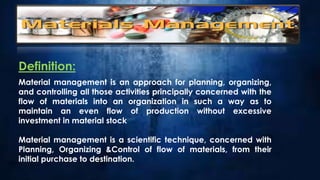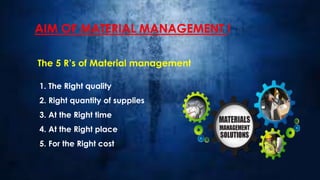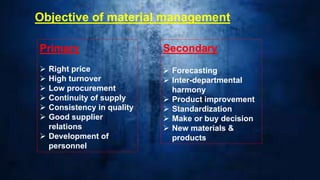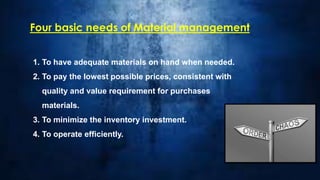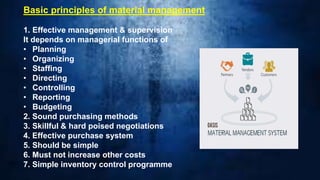Material Management
- 1. By , Biki Sonar UNIVERSAL BUSINESS SCHOOL Material management
- 2. Definition: Material management is an approach for planning, organizing, and controlling all those activities principally concerned with the flow of materials into an organization in such a way as to maintain an even flow of production without excessive investment in material stock Material management is a scientific technique, concerned with Planning, Organizing &Control of flow of materials, from their initial purchase to destination.
- 3. The 5 RŌĆÖs of Material management 1. The Right quality 2. Right quantity of supplies 3. At the Right time 4. At the Right place 5. For the Right cost AIM OF MATERIAL MANAGEMENT !
- 4. PURPOSE OF MATERIAL MANAGEMENT ’āś To gain economy in purchasing ’āś To satisfy the demand during period of replenishment ’āś To carry reserve stock to avoid stock out ’āś To stabilize fluctuations in consumption ’āś To provide reasonable level of client services
- 5. Objective of material management Primary ’āś Right price ’āś High turnover ’āś Low procurement ’āś Continuity of supply ’āś Consistency in quality ’āś Good supplier relations ’āś Development of personnel Secondary ’āś Forecasting ’āś Inter-departmental harmony ’āś Product improvement ’āś Standardization ’āś Make or buy decision ’āś New materials & products
- 6. 1. To have adequate materials on hand when needed. 2. To pay the lowest possible prices, consistent with quality and value requirement for purchases materials. 3. To minimize the inventory investment. 4. To operate efficiently. Four basic needs of Material management
- 7. Basic principles of material management 1. Effective management & supervision It depends on managerial functions of ŌĆó Planning ŌĆó Organizing ŌĆó Staffing ŌĆó Directing ŌĆó Controlling ŌĆó Reporting ŌĆó Budgeting 2. Sound purchasing methods 3. Skillful & hard poised negotiations 4. Effective purchase system 5. Should be simple 6. Must not increase other costs 7. Simple inventory control programme
- 8. Elements of material management 1. Demand estimation 2. Identify the needed items 3. Calculate from the trends in Consumption during last 2 years. 4. Review with resource constraints
- 9. Functional areas of material management 1. Purchasing 2. Central service supply 3. Central stores 4. The print shops 5. The pharmacy 6. Dietary & Linen services


